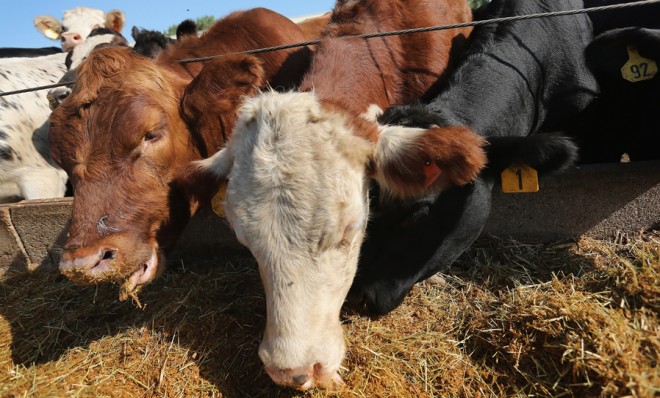Do America's cows have a drug problem?
"I've seen cattle walking down a truck ramp tippy-toed"

A free daily email with the biggest news stories of the day – and the best features from TheWeek.com
You are now subscribed
Your newsletter sign-up was successful
Some of America's cattle have been acting kind of weird lately.
Tyson Foods, the largest producer of U.S. beef, noticed that cows fed Zilmax, an animal feed additive given to cattle a few weeks before slaughter to increase their weight, were having trouble walking off the truck on their way to meet their maker. Some had trouble moving, and others just laid down with their tongues hanging out of their mouths, or sat in dog-like positions, reports The Wall Street Journal. "I've seen cattle walking down a truck ramp tippy-toed," one industry expert told the paper.
A kind of beta-agonist drug originally developed to treat asthma in humans, Zilmax alters the animals' metabolism to make them pack on lean muscle for 20 days leading up to slaughter. Introduced to the U.S. in 2007, about 70 percent of U.S. cattle now take some kind of beta-agonist drug.
The Week
Escape your echo chamber. Get the facts behind the news, plus analysis from multiple perspectives.

Sign up for The Week's Free Newsletters
From our morning news briefing to a weekly Good News Newsletter, get the best of The Week delivered directly to your inbox.
From our morning news briefing to a weekly Good News Newsletter, get the best of The Week delivered directly to your inbox.
Tyson has since said it would stop accepting Zilmax-fed cows for slaughter, and Merck & Co, the pharmaceutical company behind Zilmax, announced it would suspend U.S. and Canadian sales of the drug.
Still, Merck is defending the product, which pulled in $159 million last year (a relatively tiny slice for a company that makes $47.3 billion in global sales). Thirty separate studies in the last six years have shown Zilmax is safe, says the company, which also says it's working with Tyson to resolve the issue.
Some worry that cutting back on the drug could weaken the beef industry, which was having a rough time before Zilmax came on the scene. Here's Reuters' Lisa Baertlein and P.J. Huffstutter:
Soaring feed costs in the wake of the worst U.S. drought since the Dust Bowl and fierce demand for light corn supplies by ethanol makers resulted in cattle ranchers thinning herds. That led to too few animals to fatten up and too many feedlot operators and packing houses scrambling to get them. Adding to the industry's woes, U.S. retailers are reluctant to raise prices in fear of alienating recession-weary U.S. consumers, who are willing to shift to less expensive proteins such as chicken and ground beef.
But with the help of Zilmax, and its rival livestock drug Optaflexx, made by Eli Lilly & Co's Elanco Animal Health Unit, many feedyards say they have found a way to reduce some of the economic pain. Mixed into feed in the weeks before slaughter, beta-agonists can add as much as 30 pounds of saleable meat to a carcass. [Reuters]
So why are big players in the beef industry voluntarily cutting this drug?
A free daily email with the biggest news stories of the day – and the best features from TheWeek.com
Possibly to get out ahead of public opinion, say Baertlein and Huffstutter. "If activists got onto the issue before industry," one expert told Reuters, "it could have been ''pink slime' all over again.'"
Here's another possibility: The U.S. is simply playing catch-up with the rest of the world. Many countries, including China and Russia, have already banned meat from cattle fed with certain beta-agonists.
"It's a little bit unfortunate that it takes other countries having good standards to make an improvement in the U.S. marketplace," Patty Lovera, assistant director of Food and Water Watch in Washington, D.C. told NPR, "but at this point we'll take what we can get, I think, when it comes to how we look at the drugs that are allowed to be given to food animals."
Carmel Lobello is the business editor at TheWeek.com. Previously, she was an editor at DeathandTaxesMag.com.